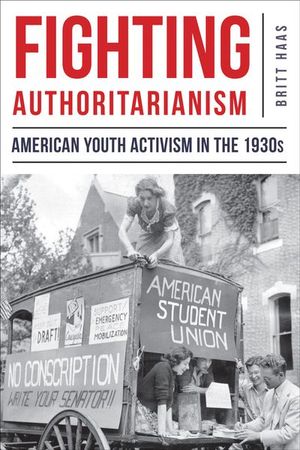Fighting Authoritarianism
Published by Fordham University Press
“This engaging study of progressive youth organizations charts their origins, their quest to fashion an America true to its ideals, and their demise.” —Phillip Deery, Victoria University, Melbourne
During the Great Depression, young radicals in New York developed a vision of and for America, molded by their understanding of the Great War and global economic collapse as well as other events unfolding both at home and abroad. They worked to make their vision of a free, equal, democratic society based on peaceful coexistence a reality. Their attempts were ultimately unsuccessful—but their voices were heard on a number of issues, including free speech, racial justice, and peace.
A major contribution to the historiography of the era, Fighting Authoritarianism provides an important new examination of US youth activism of the 1930s, including the limits of the New Deal and how youth activists pushed FDR, Eleanor Roosevelt, and other New Dealers to do more to address economic distress and social inequality, and promote more inclusionary politics. Britt Haas questions the interventionist-versus-isolationist paradigm, and also explores the era not as a precursor to WWII, but as a moment of hope about institutionalizing progress in freedom, equality, and democracy.
Fighting Authoritarianism corrects misconceptions about these activists’ vision, heavily influenced by the American Dream they’d been brought up to revere. For them, that meant embracing radical ideologies, especially the socialism and communism widely discussed, debated, and promoted on the city’s college campuses. They didn’t believe they were turning their backs on American values—instead, they thought such ideologies were the only way to make America live up to its promises. This study also outlines the careers of Molly Yard, Joseph Lash, and James Wechsler, how they retracted—and for Yard and Lash, reclaimed—their radical past, and how New York continued to hold a prominent platform in their careers. (Lash and Wechsler worked for the New York Post, the latter as editor until 1980.) Examining the decade from this perspective highlights the promise of America as young people understood it: a historic moment when anything seemed possible.
During the Great Depression, young radicals in New York developed a vision of and for America, molded by their understanding of the Great War and global economic collapse as well as other events unfolding both at home and abroad. They worked to make their vision of a free, equal, democratic society based on peaceful coexistence a reality. Their attempts were ultimately unsuccessful—but their voices were heard on a number of issues, including free speech, racial justice, and peace.
A major contribution to the historiography of the era, Fighting Authoritarianism provides an important new examination of US youth activism of the 1930s, including the limits of the New Deal and how youth activists pushed FDR, Eleanor Roosevelt, and other New Dealers to do more to address economic distress and social inequality, and promote more inclusionary politics. Britt Haas questions the interventionist-versus-isolationist paradigm, and also explores the era not as a precursor to WWII, but as a moment of hope about institutionalizing progress in freedom, equality, and democracy.
Fighting Authoritarianism corrects misconceptions about these activists’ vision, heavily influenced by the American Dream they’d been brought up to revere. For them, that meant embracing radical ideologies, especially the socialism and communism widely discussed, debated, and promoted on the city’s college campuses. They didn’t believe they were turning their backs on American values—instead, they thought such ideologies were the only way to make America live up to its promises. This study also outlines the careers of Molly Yard, Joseph Lash, and James Wechsler, how they retracted—and for Yard and Lash, reclaimed—their radical past, and how New York continued to hold a prominent platform in their careers. (Lash and Wechsler worked for the New York Post, the latter as editor until 1980.) Examining the decade from this perspective highlights the promise of America as young people understood it: a historic moment when anything seemed possible.
BUY NOW FROM
COMMUNITY REVIEWS
